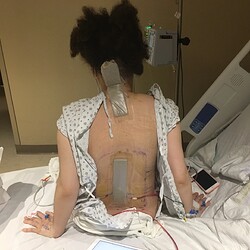I previously posted about Jenn Brea, who experienced huge improvement in her condition before facing a setback to her health which caused her to greatly reduce her position at MEAction (the charity that she founded).
Her blog post highlights the huge downside with experimental surgery that ME/CFS patients are trying:
Of an unknowable number of people who have had surgery, at least nine of us have had a total remission of post-exertional malaise (PEM) and postural orthostatic tachycardia (POTS), and several others, varying degrees of improvement. (These figures include me and Jeff Wood.)
With 20/20 hindsight, we know that Brea’s ‘total remission’ didn’t last.
The blog post continues:
Most of those diagnosed have not had surgery and those who have are still very early in their recovery process. One member of our community, Jenny Rowbury, who had surgery in England for both a Chiari malformation and craniocervical instability, and also has vascular EDS, has had a devastating outcome.
Jenny Rowbury is still in really bad shape since her Jan 20 blog post about her post-surgery condition. Her GoFundMe has a April 29, 2023 update which talks about rolling the dice again on surgery.
Operation Warp Speed taught us why experimental medicine is bad
Yes, I’ve put tilorone into my body. (It’s approved in ex Soviet bloc countries but not in the Western world.) But we need to talk about the stuff that people (like me) are doing to try to find effective treatment for vax injury and other chronic illnesses.
Thanks to survey data - see the Treatment Outcomes Survey’s raw analysis here - we have a much better idea about what’s safe in chronic illness patients. We also know about treatments that are risky- and that list is really unintuitive. It turns out that some people react really badly to acupuncture. Who would’ve guessed? Regardless, not everybody is going to stick to treatments where data exists to support the use of that treatment. So let’s talk about how we might approach experimental medicine more responsibly.
- First, we need to recognize that patient acedotes aren’t always the most reliable sources of information. The scraping data from Eureka Health shows that there’s a huge bias towards reporting positive outcomes.
- Secondly, we should recognize that some good data goes unreported. For example, a ME/CFS patient named Jack committed suicide after he worsened from HELP Apheresis in Cyprus. The #TeamClots people don’t talk about this, sometimes because there is a lot of research grant money on the line. Some (well-meaning) patients will attack people who voice doubts about the microclots theory. The end result is that we don’t stop medical experimentation that should be stopped.
- We don’t have great safety monitoring in place for the experimental treatments that people are trying. Negative results often go unreported. There may be research grant funding at stake, a medical professional’s reputation on the line, or a patient’s reputation on the line. Some medical professionals even lie about the outcome of treatment (e.g. Avindra Nath has faced accusations).
So… yeah. Let’s be a little more careful about what we read on the Internet.
